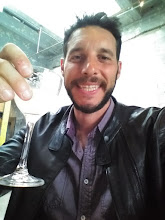From that point on, it was once again a landlord at the center of the driver’s now grown-up scorn. It wasn’t only that he raised the rent upon a whim, and refused to even supply the materials with which the couple could fix up the cottage that he owned. It was, above all that, the way the landlord leered at Paula; so overtly that the driver could see what he was thinking, written as it were on his sick grin. There were also the few obscenities he would address to Paula –in a low, slithering whisper- when he managed to work up the nerve and when the driver was sure to be at the ranch.
That’s why the driver would have suspected him right away when he found Paula like that, splayed on the concrete steps leading up to their box of a home, if he hadn’t known better. Lucky for the landlord, the most probable suspect was already known to be out of prison and on the prowl.
“Probable”, that is, to the driver and his fiancé. As far as the police would have been concerned, all signs would have pointed back to the landlord, assuming the driver could have accounted for his whereabouts for the entirety of his midnight break at the ranch. He can hear the detective’s incredulous chortle now, “An’ tell me, I s’pose you never drove the eight miles back home durn’ yer breaks?”
The driver feels a hatred rise up in his chest that can only thinly disguise itself as heartburn. A cheer sweeps over the crowd gathered beneath the tree. The mayor –or whoever he may be- must finally be drawing his speech to a close.
Even with a town center bustling with people, there hangs over the scene an odd stillness. Perhaps it is wrong to call it loneliness. It affects residents and visitors alike with a vague sense of unease. Unlike the blunt sting of emptiness –like the whiff of rotting coyote among the desert’s abandoned shacks- Barstow exudes a more subtle stench.
The driver enters the square at the back of a procession. Through the half-opened window, on the heels of muffled revelry, wafts a longing for something that may never have been, but is missing all the same. He can see it on the official’s face as he grows closer and almost chokes on self-laudation. It’s phoniness, and everyone is taking in their share. The driver is reminded of yet another reason to dislike Christmas.

